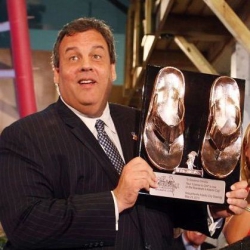
Chris Christie at the opening of the Margaritaville Restaurant at the Resorts Casino in Atlantic City.
New Jersey Governor Chris Christie said on Thursday he would like to give Atlantic City casinos more relief from regulations in the month and a half. Gov. Christie made his statement after a discussion with executives from MGM Resorts and Caesars Entertainment.
The governor said he would unveil more details within the next 30 to 45 days. Christie said, “We’re going to be working with them on additional ways we can bring Atlantic City’s regulations into the 21st century.”
MGM Resorts CEO Jim Murren and Caesars Entertainment CEO Mark Frissora neither one stated what manner of relief they were seeking. Past policy rollbacks might be a signpost to what Gov. Christie has in mind, though.
Christie’s 2011 Initiative
In 2011, Gov. Christie reduced a number of regulations on Atlantic City casinos. Previously, all license holders had to re-apply for a license every 5 years.
While the application process was a formality, all applicants had to pay an expensive licensing fee. In 2011, Christie made the casino license valid indefinitely. At the same time, Christie placed much of the gambling oversight duties under the Attorney General’s Office, instead of the Casino Control Commission.
When he made those changes, Chris Christie sought from the legislature sweeping authority to take over Atlantic City’s local government, in order to put its finances in order. That did not happen in 2011, but Christie finally won that right in November 2016, when he appointed financial overseers for Atlantic City, whose financial situation had cratered by that time.
“Significant New Investments in Atlantic City”
After Thursday’s meetings, Governor Chris Christie suggested in a tweet a kind of quid pro quo. He posted, “MGM Resorts and Caesars are ready to make significant new investments in Atlantic City.”
Presumably, they asked for a rollback on regulations in order to justify those new investments.
In the wider view, Christie’s Twitter comments suggest that Atlantic City’s casino industry has steadied. Most reports suggest that the 7 remaining casinos in Atlantic City have seen their financial outlook brighten in the last 3 years. Five casinos have closed their doors in that time, though that allowed financial equilibrium to be reached, as gamblers from the closed casinos gravitated towards other establishments.
Jim Murren on MGM Resorts’ AC Investment
Previously, Jim Murren had touted MGM Resorts’ investment in Atlantic City. MGM Resorts spent $800 million to buy out the other 50% of Borgata from Boyd Gaming, representing stellar confidence in Atlantic City’s future. Of course, Borgata generates over 40% of the casino revenues for the entire city.
Mark Frissora on Atlantic City’s Future
Mark Frissora said that Caesars Entertainment has followed suit. Frissora said that Caesars has invested about $300 million in Atlantic City since 2014. Caesars owns three of the casinos operating in the city right now: Caesars Atlantic City, Harrah’s Atlantic City, and Bally’s. The company closed the Showboat in 2014.
When asked about company’s outlook on Atlantic City, Mark Frissora said, “We continue to see a lot of vibrancy. We know that the future is bright.”
Hard Rock Atlantic City
One reason Caesars and MGM might have asked for more concessions is anticipation of more competition in the near future. Carl Icahn sold Trump Taj Mahal to Hard Rock International — aka the Seminole Tribe of Florida — which plans to reopen the Taj under the name Hard Rock Atlantic City. The Seminoles are a major new competitor which has sought expansion into the northeast for a long time. The tribe has announced it would spend $300 million to renovate the Trump Taj Mahal.
TEN Casino
Another Florida company, Polo North, bought the Revel Building out of bankruptcy and might one day re-open a casino. Polo North’s Glenn Straub has twice sought to reopen the hotel portion of the Revel Casino, and has renamed his enterprise TEN Casino. Licensing issues have plagued Glenn Straub’s efforts, but the possibility of two new casinos loom over the future.
If the casino industry in Atlantic City expands from 7 to 9 casinos, then some of the previous market issues might reappear. Thus, Mark Frissora and Jim Murren might be planning for a time when the picture is not so rosy.
